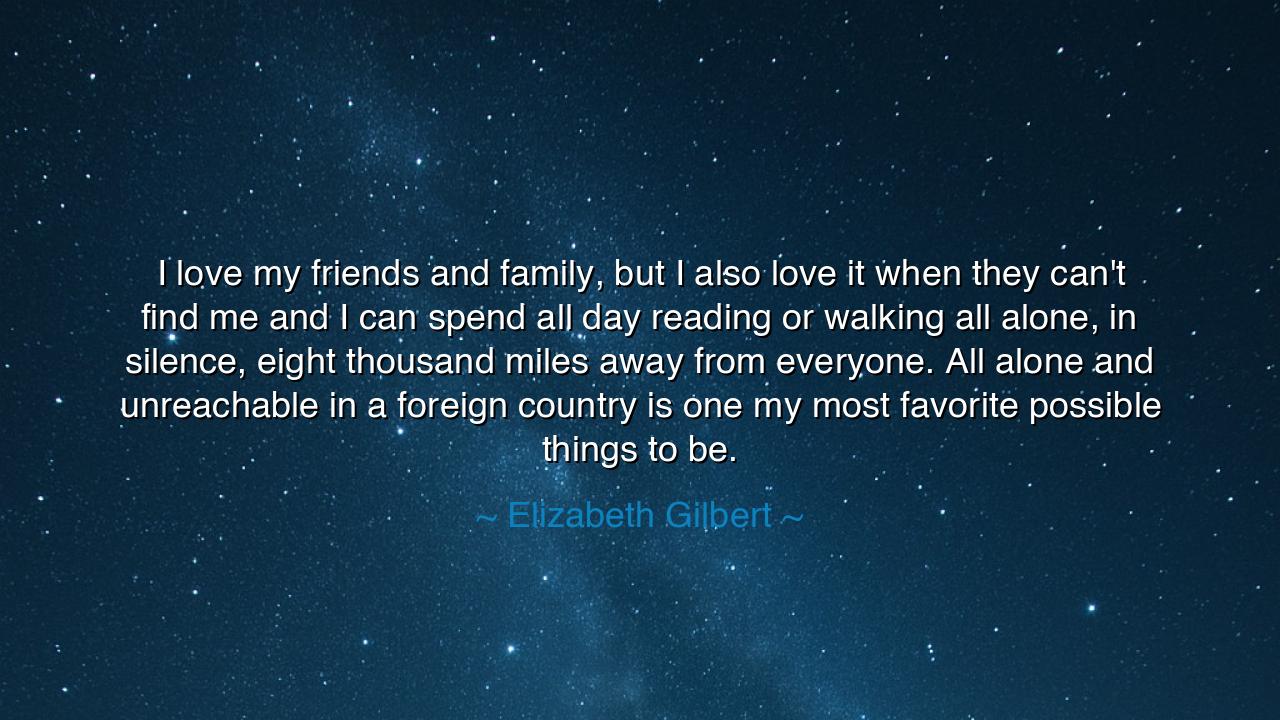
I love my friends and family, but I also love it when they can't
I love my friends and family, but I also love it when they can't find me and I can spend all day reading or walking all alone, in silence, eight thousand miles away from everyone. All alone and unreachable in a foreign country is one my most favorite possible things to be.






"I love my friends and family, but I also love it when they can't find me and I can spend all day reading or walking all alone, in silence, eight thousand miles away from everyone. All alone and unreachable in a foreign country is one of my most favorite possible things to be." These words by Elizabeth Gilbert speak to a profound longing that resides deep within the heart of the human soul—a desire not to escape from the world, but to retreat into it with purpose and intention. Gilbert’s reflection on the joy of solitude and isolation in a foreign land reveals a truth that has echoed through time: there are moments when we must withdraw from the world in order to reconnect with our inner selves. In the silence of solitude, we often find the clearest voices of wisdom, the most profound understanding of our own hearts.
From the dawn of civilization, great minds have understood the power of solitude. Socrates—the father of Western philosophy—often withdrew from the hustle and bustle of Athenian life, retreating into deep reflection to ponder the meaning of existence. He famously said, “The unexamined life is not worth living.” In this pursuit of wisdom, Socrates sought solitude not as an escape but as a necessary discipline for clear thought and spiritual growth. Just as Gilbert finds solace in being alone, so did Socrates, who, despite his profound connections with his students and the city, often sought quiet reflection away from the noise of the world.
Consider also the life of Henry David Thoreau, whose own experience of solitude at Walden Pond became the foundation for his seminal work on living deliberately. Thoreau’s retreat into the woods was not merely a physical act of isolation, but a spiritual quest. He sought to live in harmony with nature, to strip away the distractions of society, and to listen to the inner rhythm of his soul. In solitude, Thoreau discovered that the true richness of life is not found in constant interaction or the approval of others, but in the quiet, undisturbed moments when we can hear our own thoughts and feel the pulse of the world around us. For Thoreau, and for Gilbert, solitude was not an absence of connection but a space for deeper understanding and personal growth.
But in modern times, the idea of solitude has often been misunderstood. Many view it as a form of loneliness, a deprivation, a void to be feared and avoided. Yet, as Gilbert so beautifully expresses, there is a freedom in being unreachable and alone, a kind of liberation that only comes when we are free from the expectations and demands of others. It is in these moments of stillness that we can reconnect with our truest self, unclouded by the judgments or needs of those around us. In a world filled with constant noise—social media, work, family obligations—it is easy to lose touch with the part of us that exists beyond these roles. But as Gilbert finds in her solitude, there is a powerful clarity in being unreachable, a chance to rediscover the parts of us that get buried under the weight of daily life.
In this way, the wisdom of Elizabeth Gilbert reminds us that there is a sacredness in retreating from the world. Just as the ancient philosophers often sought quiet spaces to contemplate and reflect, so too should we carve out moments of silence in our own lives. Whether through travel to distant lands or through simple acts of stillness at home, it is in these pauses that we recharge, reflect, and recenter ourselves. Solitude, when embraced with intention, is not a rejection of the world, but a way to engage with it more fully.
Solitude also has the power to deepen our relationship with the world around us. Consider Marco Polo, the Venetian explorer who journeyed alone through the vast landscapes of Asia. It was in the solitude of his travels that he observed cultures, learned languages, and formed ideas that would shape the course of history. It was in the distance from his homeland that he saw the world in its truest form, unclouded by his preconceived notions. Like Gilbert, Polo discovered that being alone and unreachable in a foreign land allowed him to experience life with greater clarity and understanding.
The lesson to take from Gilbert’s words, and from the lives of those who have found wisdom in solitude, is this: do not fear moments of aloneness, for in them lie the seeds of self-discovery and growth. The next time you find yourself alone, instead of feeling the pang of isolation, embrace the opportunity to walk, to read, to listen—to simply be. Use that time to reconnect with your own spirit, to understand the direction of your life, and to cultivate a peace that only solitude can bring. Whether near or far from home, the quiet of solitude is a gift that can illuminate the path to a more authentic life.






AAdministratorAdministrator
Welcome, honored guests. Please leave a comment, we will respond soon